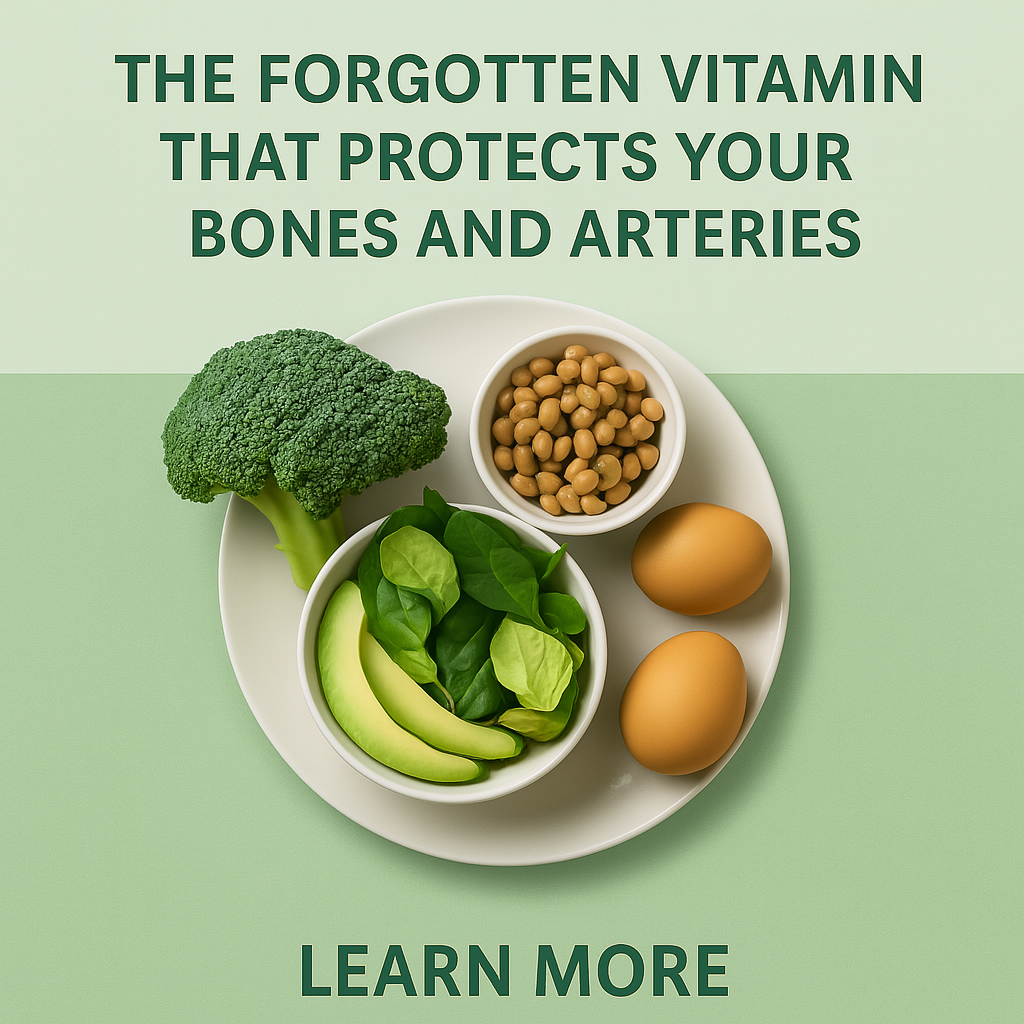
Vitamin K: Der vergessene Nährstoff, der Sie stark und geschützt hält
Vitamin K ist seit langem für seine Rolle bei der Blutgerinnung bekannt, doch neuere Forschungen zeigen, dass es eine weitaus komplexere und wichtigere Rolle für unsere Gesundheit spielt. Insbesondere in seiner K2-Form trägt dieses Vitamin dazu bei, unsere Knochen stark, unsere Arterien flexibel und das Kalzium im Körper an den richtigen Stellen zu halten. Die meisten Menschen kennen diesen Nährstoff, doch nur wenige nehmen ausreichend davon zu sich – und die Folgen können bis zum Ausbruch einer Krankheit unsichtbar bleiben.
Vitamin K ist keine einzelne Substanz, sondern eine Gruppe fettlöslicher Verbindungen. Die beiden am besten untersuchten Formen sind K1 (Phyllochinon) und K2 (Menachinon). Vitamin K1 kommt hauptsächlich in grünem Blattgemüse vor und wird hauptsächlich von der Leber zur Unterstützung der Blutgerinnung verwendet. Vitamin K2 hingegen ist in fermentierten Lebensmitteln, Eiern, Leber, Milchprodukten von Weidetieren und Fleisch enthalten. Es spielt im gesamten Körper eine viel aktivere Rolle, insbesondere in Knochen, Arterien und Weichteilen.

Während Vitamin D die Aufnahme von Kalzium unterstützt, transportiert Vitamin K2 das Kalzium in die Knochen und Zähne – und weg von den Arterien. Ohne ausreichend K2 kann sich Kalzium an Stellen ansammeln, wo es nicht hingehört, was zu Arterienverkalkung und -verhärtung führt. Dies ist ein wichtiger Risikofaktor für Herzerkrankungen.
Eines der wichtigsten durch Vitamin K2 aktivierten Proteine ist das Matrix-Gla-Protein (MGP), das der Kalziumablagerung in den Arterienwänden vorbeugt. Ein weiteres Protein ist Osteocalcin, das die Integration von Kalzium in die Knochenmatrix unterstützt. Beide Proteine sind auf ausreichend Vitamin K2 angewiesen, um aktiviert zu werden und ihre Aufgabe zu erfüllen.
In Japan, wo Natto (ein fermentiertes, K2-reiches Sojaprodukt) häufig gegessen wird, ist die Rate an Knochenbrüchen und Arterienverkalkung im Vergleich zu westlichen Ländern deutlich niedriger. Langzeitstudien zeigen, dass die regelmäßige Einnahme von Vitamin K2 mit einem geringeren Risiko für Osteoporose, koronare Herzkrankheiten und sogar bestimmte Krebsarten verbunden ist.
Vitamin K2 unterstützt auch die Gesundheit des Gehirns. Neue Erkenntnisse deuten darauf hin, dass es zum Schutz von Neuronen und zur Reduzierung von oxidativem Stress im Gehirn beitragen kann, was möglicherweise Auswirkungen auf die Vorbeugung neurodegenerativer Erkrankungen hat. Obwohl in diesem Bereich noch weitere Forschung erforderlich ist, sind die ersten Erkenntnisse vielversprechend.
Moderne Ernährungsweisen enthalten oft zu wenig Vitamin K2, insbesondere in Bevölkerungsgruppen, die fermentierte Lebensmittel, Leber oder herkömmliche tierische Fette meiden. Auch die industrielle Landwirtschaft spielt eine Rolle: Tiere, die mit getreidereicher Nahrung aufgezogen werden, produzieren weniger Vitamin K2 in Milch, Eiern und Fleisch als Tiere aus Freilandhaltung.
Zur Unterstützung einer optimalen Vitamin-K-Zufuhr:
Essen Sie täglich Blattgemüse, um Vitamin K1 zu erhalten. Nehmen Sie fermentierte Lebensmittel wie Natto, Miso oder rohes Sauerkraut zu sich. Wählen Sie Produkte von grasgefütterten Tieren, insbesondere Eigelb, Käse und Butter. Keine Angst vor Fett – Vitamin K ist fettlöslich und wird am besten durch gesunde Fette aufgenommen.
Vitamin K1 und K2 wirken zusammen, doch K2 geht oft verloren. Die beste Strategie ist, sich auf echte, minimal verarbeitete Lebensmittel aus vertrauenswürdigen Quellen zu konzentrieren. Bei Real Food arbeiten wir eng mit Kleinbauern zusammen, die Tiere auf der Weide halten und fermentierte Lebensmittel nach traditionellen Methoden herstellen – so geben wir Ihrem Körper, was er wirklich braucht, um stark und geschützt zu bleiben.
Für Menschen, die sich pflanzlich ernähren, ist es wichtig zu wissen, dass die Aufnahme von Vitamin K2 ohne Nahrungsergänzungsmittel schwierig sein kann, es sei denn, sie konsumieren regelmäßig fermentierte pflanzliche Lebensmittel. Miso, Natto und einige gereifte Sojasaucen können hilfreich sein, die Mengen variieren jedoch stark.
Fazit: Vitamin K ist wichtig für den Kalziumhaushalt, die Knochenintegrität, den Herz-Kreislauf-Schutz und möglicherweise auch für die Gehirngesundheit. Dennoch wird es oft übersehen. Indem Sie auf natürliche, nährstoffreiche Lebensmittel zurückgreifen, stellen Sie sicher, dass Ihr Körper das bekommt, was er braucht – und vermeiden Sie schleichende Schäden, die sich mit der Zeit entwickeln können.
Vitamin K wird vielleicht nicht viel Aufmerksamkeit geschenkt, aber es verdient einen Platz im Mittelpunkt jedes gesunden Ernährungsstils.
